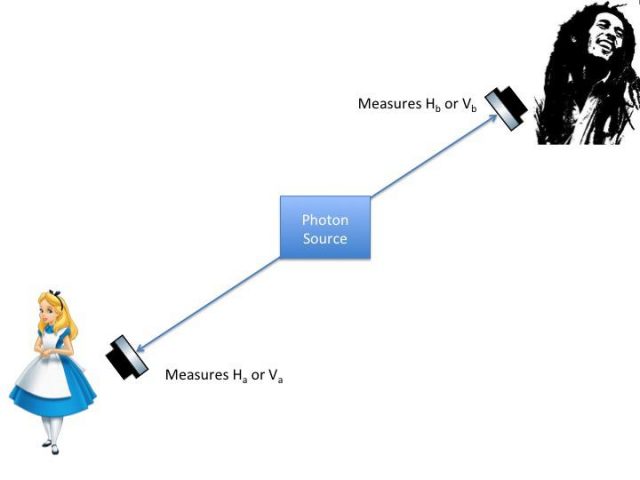The loophole-free quantum entanglement experiment (4): The free will loophole
The loophole-free quantum entanglement experiment (4): The free will loophole
In previous posts, we have discussed the two main loopholes of Bell experiments, the locality loophole, and the detection loophole. Both were closed a long time ago, but only recently they were closed in the same experiment. Let us summarize the kind of experiments we are dealing with by an example. Alice and Bob will share two parts of a quantum system. In our example, they share different photons generated by the same source. These photons have a property called ‘linear polarization’ that can be measured in two different bases, horizontal (H) or vertical (V). Both Alice and Bob measure randomly H and V many times and they share their data. With this information, they can calculate a magnitude composed of mean values. If this magnitude is higher that a certain threshold we can conclude that Bell’s inequality is violated and they have detected entanglement. The universe is either non-local or random. To perform a conclusive experiment their labs should be separated, in order to avoid the locality loophole, and they need to measure the photons with a certain efficiency to avoid the detection loophole.

Unfortunately, for some people avoiding the locality and detection loopholes is not enough. There is still a loophole to take into account, one that has not been closed and probably never will [a]. It is sometimes called the ‘Free-Will Loophole’ and the concept behind it is called ‘Superdeterminism’. The idea is the following, Bell’s inequality is based on average values and to ensure that we have a legitimate violation we need to be sure that the average measures we calculate are independent of each other. This means that Alice and Bob should select the basis of their measurements in a random and independent way. Naively, one can assume that this is not a problem at all. As Alice and Bob are in different labs and they are different people, they can select the basis just by flipping a coin. The question is if this is a real way of choosing random independent numbers. What happens if Alice’s coin is entangled with Bob’s coin? How can we know they are not conspiring against the experiment?
This is a very philosophical claim that can affect any possible experiment. It was already stated by John Bell in communications with Aspect when the first experiments were performed. In an interview in 19801 Bell claimed:
There is a way to escape the inference of superluminal speeds and spooky action at a distance. But it involves absolute determinism in the universe, the complete absence of free will. Suppose the world is super-deterministic, with not just inanimate nature running on behind-the-scenes clockwork, but with our behavior, including our belief that we are free to choose to do one experiment rather than another, absolutely predetermined, including the “decision” by the experimenter to carry out one set of measurements rather than another, the difficulty disappears. There is no need for a faster than light signal to tell particle A what measurement has been carried out on particle B, because the universe, including particle A, already “knows” what that measurement, and its outcome, will be.
Some researchers tried to avoid this loophole by the use of quantum random number generators. These generators use measurements on quantum systems to generate truly random numbers [b]. This sounds like a reasonable solution, but it suffers from the fallacy of circular reasoning. We can only prove that quantum measurements outcomes are random by violating Bell’s inequalities so we cannot use quantum randomness in the experiment.
As I said before, this is a very philosophical loophole and it can never be closed. Many scientists, as Anton Zeilinger, consider it a false loophole and they state that it should not be taken into account. In their opinion, this issue does not only affect Bell’s experiments but all kind of experiments. If Nature is conspiring to give us incorrect questions there is nothing we can do to unravel her secrets.
Notes:
[a] This claim contrasts with the title of this posts “the loophole-free quantum entanglement experiment”. As it is explained in the post, this loophole is a more philosophical one, and many researchers consider it irrelevant. Because of that, if an experiment closes the locality and detection loopholes it is considered loophole-free.
[b] This are supposed to be truly random numbers in comparison with random numbers generated by computers that are determined in a deterministic way. Random numbers generated by computers are considered pseudorandom numbers.
References
- The Ghost in the Atom: A Discussion of the Mysteries of Quantum Physics, by Paul C. W. Davies and Julian R. Brown, 1986/1993, pp. 45-46 ↩